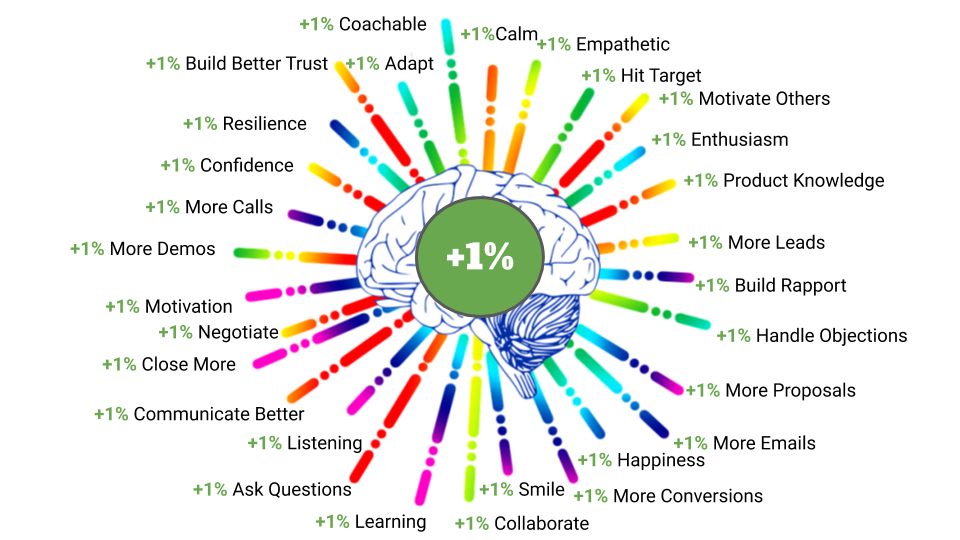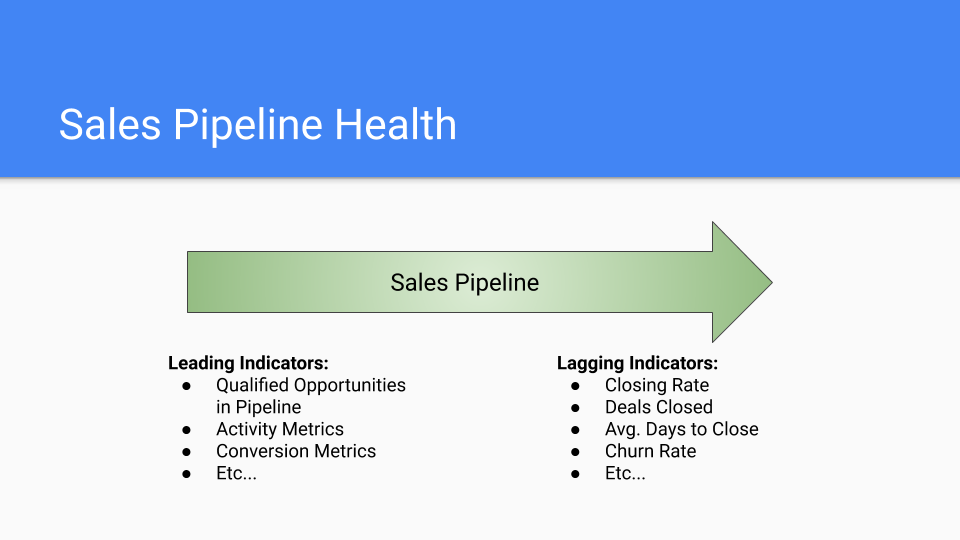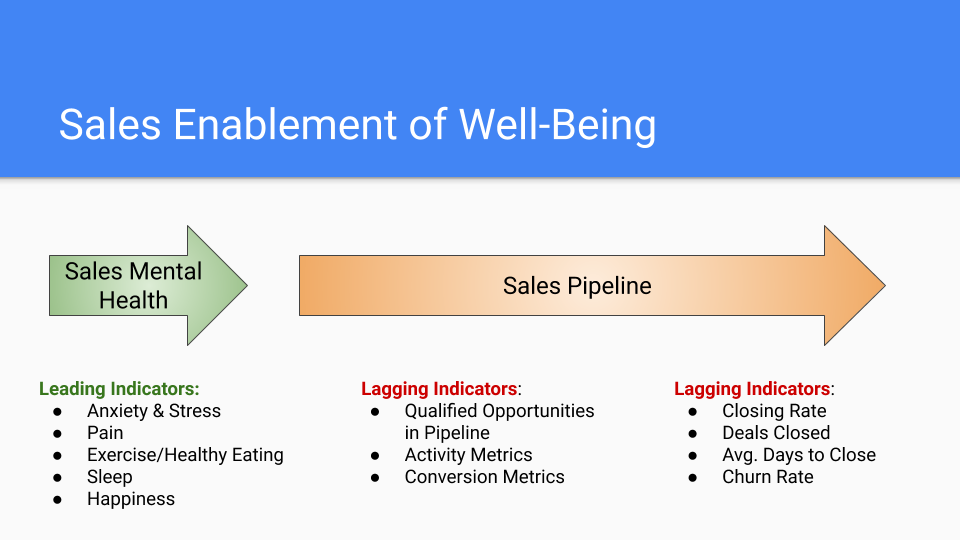The sales enablement industry is expected to grow from 1.1 billion in 2019 to $2.6 billion by 2024. Rapid growth like this only happens when something is proven to be effective. Sales organizations are investing millions into sales enablement teams, resources and technology to help accelerate revenue growth.
According to Hubspot, sales enablement is the process of providing your sales team with the resources they need to close more deals. These resources may include items like new technology, tailored sales messaging or targeted customer information.
Anything that will help salespeople sell more effectively and close more deals.
Sales enablement works, because it is easy to measure the effectiveness of new resources, templates and strategies using sales KPIs. This data allows sales enablement teams to iterate quickly and continuously improve sales processes within their organizations. Compound this with new technology that is automating manual sales processes like prospecting and emailing – and you have a sales machine.
Sales enablement is empowering modern sellers to sell faster and better than ever before.
However, with great speed comes great responsibility. Even with all this data providing “insight”, using the wrong KPIs in our analysis can create massive blind spots that will impact sales performance.
Fossil Fuels, Sales Enablement & The Wrong Data
Think about the Oil and Gas industry for a moment. Fossil fuels have enabled the global economy to flourish and expand faster than ever before in human history. This growth rate has made countries, corporations and individuals wealthy beyond our wildest dreams.
Using GDP, wealth and growth KPIs – the Oil and Gas industry paints a picture that displays a successful and sustainable global economy. But they don’t paint the full picture and overtime new data is changing this perspective.
Environmental and socioeconomic KPIs are painting a new picture that shows a world in peril. This data is showing that we’ve neglected the foundation on which our global economy is built. Without a functioning society and a healthy environment – a global economy will cease to exist.
As we now try to repair this foundation on which our economy is built, this process is proving to be more costly than expected and extremely difficult. Something that could have been avoided if the right data was being measured and prioritized earlier.
I fear a similar picture is being painted within sales organizations today. To no fault of their own, everyone in sales is simply looking at the wrong data. Healthy sales KPIs and revenue growth rates are distractions and illusions of “success”.
In reality, a massive Mental Health blind spot is rapidly eroding the foundation on which successful sales team performance is built.
The Mental Health in Sales Blind Spot
Prior to the pandemic more than 2 in 5 salespeople struggled with their Mental Health. More recently, 52% of salespeople said their Mental Health is worse now, compared to the 6 months leading up to COVID. Mental Health issues have also increased significantly in young adults over the last decade and the pandemic is accelerating the growth of this blind spot.
It’s crazy to think that almost every new salesperson or employee joining a company in the near future will have an addiction. Whether that be a phone addiction, social media addiction or something else – this is uncharted territory for companies.
As sales teams become more anxious, depressed and burnt out – their sales performance will suffer. New sales enablement resources and technology can temporarily sustain high performance and rising quotas, but eventually declining Mental Health will wash away the foundation.
This means sales organizations need to embrace a new role to help them address this blind spot.
The Sales Enablement of Well-Being (Kudos to Nick Neral for first coming up with the name of the role).
A role that helps salespeople sell more effectively through better Mental Health and well-being.
The Sales Enablement of Well-Being & First Principles
The Sales Enablement of Well-Being means we get back to basics and use a first principles approach in sales. In doing so, we can redesign our “process” for helping salespeople close more deals through better Mental Health.
As Ozan Varol states in his book, Think Like A Rocket Scientist:
“Process by definition is backward looking. It was developed in response to yesterday’s troubles. If we treat it like a sacred pact – if we don’t question it – process can impede forward movement. Overtime our organizational arteries get clogged with outdated procedures.”
When we look at Mental Health and employee engagement data, we can see these arteries are starting to clog. Even though the warning signs are clear, it is engrained in our human DNA to follow the same process as everyone else. To stay safe inside the herd and mitigate the reputational risk of trying something new.
But this exactly what we must do – challenge the status quo.
Not because putting the Mental Health of our sales team first is the morally right thing to do; but because this is actually the best way to close more deals in sales. Plus this is the primary function of sales enablement.
Enjoying This Post? Learn How to Thrive Under Pressure and Hit President’s Club
First Principles in Sales
First principle thinking helped NASA put a man on the moon and continues to support our human exploration of space. This approach has also allowed companies like Apple, Amazon and Tesla to disrupt long established industries with outdated processes.
Within sales enablement, first principle thinking means abandoning all loyalty to your current sales process and strip “sales” down to its most basic components. When we take away the pitch decks, spread sheets, automation technology, scripts, CRMs, emails, products and phones…
What do we have left?
We have a salesperson with a brain.
This is the foundation on which everything in sales is built. Therefore, improving the Mental Health and well-being of the person is step one. Trying to “close more deals” by starting anywhere else would be inefficient.
Linear VS Exponential Thinking in Sales Enablement
Using a traditional sales enablement methodology means we approach sales with a linear mindset, which can be improved upon.
Naveen Jain, winner of the Albert Einstein Technology Medal, eloquently explains linear thinking in the book Limitless by Jim Kwik. Jain explains most of us adopt a linear form of thinking, which causes us to look at a problem and then seek a solution.
In sales, when we see a problem with how our team is prospecting, we solve it with a new data provider or automation tool. When we see a problem with close rates, we invest into negotiation training or improve our discovery question process to dig deeper. If we want our sales team to make more phone calls, we invest into an auto-dialer or set structured calling blocks.
According to Jain, linear thinking means we approach a problem from a number of angles. We wear different hats to address the problem that stretch our thinking. In some cases we might even find a solution to the problem that effectively moves sales performance forward in a meaningful way.
Exponential thinking means we take the first principals approach mentioned earlier to address the root cause of the problem. This approach in sales leads to world changing and exponential progress in sales performance.
For example, if we’re able to improve the Mental Health of our Mind in sales by 1% – we exponentially improve our ability to close more deals. We do this by simultaneously improving all of the skills and traits connected to the Mind that we know make a salesperson great. Rather than tackling each one of them individually and in a linear way.

Workplace Mental Health Data
This is why it’s not surprising when the WHO reports; for every $1 USD put into scaled up treatment for common mental disorders, there is a return of $4 USD in improved health and productivity.
These numbers may seem high – but they’re on track. Organizations like Bell, who have taken workplace Mental Health seriously are seeing even better results. Their 2018 ROI on workplace Mental Health programs was $4.10 for every dollar invested. This was described in a recent report done by Deloitte on the ROI in workplace Mental Health.
Exponential thinking requires those in sales enablement to have the courage to break away from the herd and try something different. There is greater risk associated with this approach, but the exponential payoff for the sales organization is well worth it.
Sales KPIs And Sales Pipeline Health
Implementing a role focused on the Sales Enablement of Well-Being requires organizations to change how they’re currently measuring the “Health” of their sales pipeline. Current sales pipelines are being measured using a combination of leading and lagging indicators.
Leading indicators may include sales metrics like:
- Qualified opportunities in sales pipeline.
- Activity metrics (calls, email, etc.)
- Conversion metrics.
Lagging indicators may include these sales metrics:
- Deal close rate.
- Total deals closed.
- Average time to close.
- Churn rate.

Traditional sales enablement teams typically adjust their strategy based on these leading and lagging indicators to help improve sales pipeline health in a linear way.
They ask questions like:
- What resources can we provide the sales team to help them book more qualified opportunities?
- What technology can we purchase to ramp up activity metrics?
- Based on close rates, what sales competencies do we need to develop in the team to increase the percentage of closed deals?
Though these strategies may be effective and make meaningful improvements – they do not address the Mental Health foundation driving sales performance. As a result teams are unaware of the impact declining Mental Health is having on pipeline health. Even worse, these traditional KPIs are catching the erosion of this foundation too late and only after many days, weeks or months of underperformance.
As a result, most of the time “performance issues” are blamed on gaps in sales competencies or issues with the sales rep. Rather than the accurately identifying performance issues that occur because of declining Mental Health due to built up stress, anxiety, depression or burnout.
Enjoying This Post? Learn How to Thrive Under Pressure and Hit President’s Club
Sales Enablement Of Well-Being KPIs
The Sales Enablement of Well-Being means we iterate on the traditional sales pipeline model. It means we acknowledge the fact that both the leading and lagging indicators previously mentioned, are in fact both lagging indicators.
The real leading indicators help us answer questions like:
- How is their Mental Health? Are they anxious? Depressed?
- What’s their stress level this week compared to last?
- How is their Physical Health? Are they exercising, sleeping and eating healthy?
- Do they find work meaningful and are they connected to the company’s purpose?
- What’s their level of self-esteem? Are they feeling confident before making calls today?

Only when we start measuring and prioritizing the data in our Mental Health blind spot can we find the root cause and exponentially improve sales performance.
This is the function of Sales Enablement of Well-Being:
Providing EQ, Resilience and Mental Health resources that improve these leading indicators and well-being metrics. Resources, training and technology that help sales reps respond to stressful sales situations in a mentally heathy way. Strategies that start an upward spiral in sales performance and well-being, rather than a downward spiral.
This is how organizations can help salespeople sell more effectively and close more deals. By treating them like corporate sales athletes and giving them the tools they need to level up their Mental game. As a result, this will resolve many of the performance issues and mental mistakes plaguing your sales pipeline today.
The New Frontier in Sales – The Sales Enablement of Well-Being
Thinking outside the box and stepping outside your comfort zone is scary. Uncertainty, reputational risk and emotional exposure makes us feel vulnerable. Redefining a traditional process goes against what we historically like feeling, which is the safety “strength in numbers” provides.
It’s scary, but tackling this new frontier in sales is what’s required of sales leadership. The data we should be listening to is telling us that we’re running out of time. Refusing to support Mental Health in sales will be catastrophic to sales performance in the long-term if we fail to act.
This means we need champions, heroes, Mental Health advocates and explorers who have the courage to reshape modern sales for a healthy future.
If this post has inspired you to explore the Sales Enablement of Well-Being in your organization, feel free to explore our programming below. The Sales Health Alliance provides plenty of resources and strategies to help you get started.
Learn How to Thrive Under Pressure and Hit President’s Club
About The Author

Jeff Riseley is currently the Founder of the Sales Health Alliance and Mental Health Advocate. With over a decade of sales experience – Jeff understands the importance of Mental Health in achieving peak sales performance.
Jeff combines his sales (Sales Knowledge Institute) and Mental Health expertise to improve sales performance through a mix of sales mentorship and mental health best practices. His strategies have helped sales teams improve their sales process, while helping them become more motivated, resilient and better equipped to tackle stressful events within sales.
He is currently delivering these strategies through on-site workshops, coaching and speaking engagements. To explore working with Jeff contact him at [email protected]




